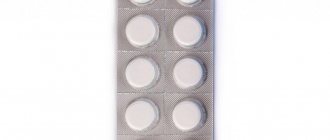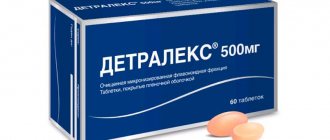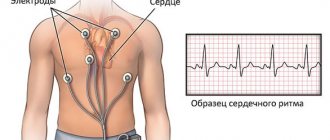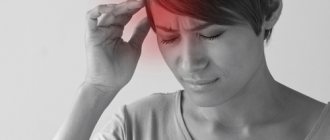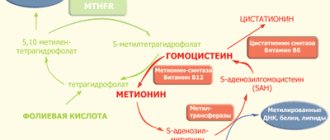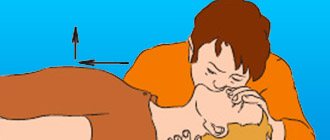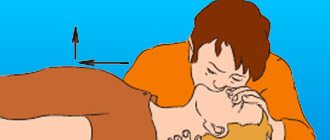Medicines that increase blood pressure are of interest to either hypotensive patients who need to get rid of a symptom, or hypertensive patients who want to prevent an even greater increase in pressure. Hypotension (decreased blood pressure) threatens drowsiness, fatigue (even if a person has slept and rested normally), decreased mental abilities and physical activity. A person becomes drowsy and may sleep longer at night than people with normal blood pressure.
- Non-drug treatments for hypotension
- Medicines for high blood pressure
- Citramon to increase blood pressure
- What does Askofen help with?
- Does Coficil Plus increase blood pressure?
- Does pu-erh increase blood pressure?
- Pressure and Cordiamine
- Does creatine increase blood pressure?
- Does Ketorol increase blood pressure?
- Propolis - for blood pressure?
- Antibiotics and blood pressure
- Ascorbic acid and blood pressure
- Pentalgin - does it lower blood pressure?
- Does Echinacea Increase Blood Pressure?
- Ibuprofen increases blood pressure
- Actovegin for blood pressure
- Pentalgin and blood pressure
Non-drug treatments for hypotension
It is possible to increase blood pressure without medications to some extent, and this measure is purely individual. It is important to walk in the fresh air more often, at least an hour a day, and for pregnant women - at least an hour in the morning/afternoon and an hour in the evening. Sports or physical activity stimulates blood circulation, and accordingly, blood pressure normalizes. Although it is known that professional athletes have slightly lower blood pressure levels than other people.
If you notice problems with blood pressure, it will be useful to take a contrast shower in the morning (alternate cold and hot water). This procedure has its own characteristics, which we will not describe here. To normalize blood pressure, proper nutrition is important. During fasting, the body begins to save resources, temperature and pressure decrease. Sleep should be at least 8 hours a day for teenagers and adults. You should also avoid overwork, both mental and physical equally. Alternate mental and physical activities.
Medicines for high blood pressure
If non-drug methods of increase do not produce results, you need to resort to the use of medications. A common remedy is caffeine sodium benzoate (tablets). This stimulant is known throughout the world and is added to energy drinks. However, they increase blood pressure, but negatively affect the functioning of the gastrointestinal tract. Therefore, drinking energy drinks is not recommended!
Caffeine is also known as trimethylxanthine. This is a powder that has a bitter taste. This substance is also a diuretic; it dilates peripheral blood vessels. It increases blood pressure only for a while. With normal blood pressure, the readings may not change when taking caffeine. You should follow the dosage prescribed by your doctor (or indicated in the instructions for the drug). In large doses, the drug can negatively affect some organs; it is also rare, but it causes addiction.
The second popular remedy is lemongrass tincture. 25 drops are diluted in 100 ml of water. Give to the patient 15 minutes before meals, 2-3 times a day. It is not recommended to take this alcohol infusion at night. If you have insomnia, try using it only in the morning and at lunchtime, and after 16:00 do not drink lemongrass tincture to increase blood pressure.
Ginseng tincture is the third most popular remedy for increasing blood pressure in hypotensive patients. The drug is also believed to strengthen the immune system. Do not use this medicine in the evening as it will make it difficult to fall asleep. This remedy is also not suitable for pregnant and breastfeeding women. One dose delivers an average of 20 drops.
Eleutherococcus is also a popular remedy for raising blood pressure. It relieves accumulated fatigue and is used in frequent stressful situations. After long illnesses, the body is weakened, so the doctor may also prescribe a tincture of Eleutherococcus. But this is not only a tincture; the drug is available in capsules and tablets. There is also dry raw material that is brewed and drunk. The most popular is the liquid extract of Eleutherococcus. Take 1-3 times a day, 15-30 drops (depending on the age and weight of the patient). The course of treatment for hypotension is 30 days.
Leuzea extract normalizes blood pressure, tones the body and strengthens the body's defenses. Thanks to this remedy, the body adapts to heavy loads. Take 1-3 times a day, twenty or thirty drops. This drug is also available in tablet form, take a maximum of 3 times a day, 1-2 tablets.
All the drugs mentioned above stimulate, to a greater or lesser extent, the activity of the heart, blood vessels and nervous system. Thus, after taking one of these drugs, a person’s vascular tone increases, which is why blood pressure increases. Below we will describe how other drugs that people periodically use to treat hypotension affect blood pressure readings.
A little about vitamins – something you didn’t know about
Murzaeva Irina Yurievna
Endocrinologist, Preventive medicine
September 23, 2018
Vitamins are classified as a subtype of micronutrients that are needed by the body in small doses - mcg or mg , but are needed constantly!! Many of the vitamins can influence the formation of the cell genome and, accordingly, influence reproduction and susceptibility to cancer. In our country, hypervitaminosis does not occur physiologically, but multiple vitamin deficiencies do. Deficiency can be of 3 degrees of severity:
- vitamin deficiency (complete absence),
- hypovitaminosis (partial absence),
- subnormal security.
Next they will write about each vitamin separately and in the form of a brief reference. Since vitamins are often closely related to microelements, I will mention them a little.
- The most common deficiency is a lack of B vitamins (B1, B2, B5, B6, B12), especially in schoolchildren. This is due to the predominance of refined foods and stress.
- Allergies to B vitamins (especially injectable ones) are often associated not with “the vitamin itself,” but with sulfites that stabilize the vitamin solution. And if you are allergic to injectable forms, you may not be allergic to tablet forms.
- B vitamins are better absorbed through the gastrointestinal tract, and are used in injections only for acute conditions (radiculopathy, neuritis, etc.).
- MYTH - B vitamins provoke cancer!!! Vitamins B1+B6+B12 do not affect tumor metastasis!!! And they even have an unpronounced antitumor effect.
- Vitamins B12 and D significantly reduce the risk of pancreatic cancer.
- Vitamin E and Selenium in the experiment increased the risk of bronchial cancer - ONLY IN SMOKERS! (more than 1 pack of cigarettes per day).
- Vitamin C + Iron + Manganese (Mn) is the best three for the treatment of IDA (iron deficiency anemia).
- Vitamin B12 + Iodine + Selenium = optimal prevention of autoimmune diseases (note!!! already developed pathologies are not meant ).
- Vitamin PP + chromium (Cr) = excellent option in the treatment of insulin resistance and obesity.
- Vitamin B2 (riboflavin) + magnesium = a great migraine treatment pairing!
- For better absorption of vitamins, movement is necessary! Physical inactivity weakens the absorption of all vitamins!
- To treat osteoporosis, the dose of vitamin D should maintain its concentration in the blood at least 40 ng/ml.
- In case of atopic dermatitis, dry skin syndrome, seizures, dry lips, conjunctivitis and recurrent furunculosis that are difficult to treat, there may be a genetic predisposition to impaired absorption of vitamins (this is a separate article) - today such an analysis is available in Russian practice.
- Boys are more predisposed to polyhypovitaminosis than girls.
- Frequent nausea without signs of infection is a common symptom of vitamin B1 and B6 deficiency.
- Leg cramps are often a deficiency of Iron, Magnesium, vitamins B1 and B6.
- A history of tuberculosis in relatives and a positive tuberculin test in a patient is an almost 100% marker of a genetic disorder in the absorption of vitamin D, which requires treatment with large prophylactic doses of vitamin D.
- Complivit is a vitamin that is suitable for daily use by almost everyone. Supradin - for acute respiratory viral infections and acute respiratory infections, in a short course.
- Folic acid for preparing for pregnancy and treating hyperhomocysteinemia is better absorbed in the form of methylfolate (the active form of folic acid).
- Rosveratrol with a low-calorie diet (low-calorie diet) will help prevent hunger attacks.
- Alphalipoic acid + myoinositol + magnesium + zinc = an excellent 3-month treatment regimen for asthenozoospermia .
- Q10 + Selenium + Omega-3 + Alphatocopherol (active vitamin E) = against the background of dyslipoproteinemia, they can become an alternative to statins in the absence of cardiovascular disease and severe degrees of atherosclerosis.
- Thioctic (lipoic acid) is the best way to treat fatty hepatosis today.
- Zinc + vitamin C in the 1st phase of the cycle/vitamin E + Copper + Magnesium in the 2nd phase of the cycle = a universal scheme for stabilizing menstrual irregularities.
- Large doses of selenium that are tried to be used in thyroidology, more than 200 mcg, are fraught with toxic effects!! A dose of 75-100 mcg is sufficient for the treatment of AIT.
- 25% of the population has a defect in the absorption of vitamin B12. This is expressed by the phenomena of neuropathy - periodic numbness of the toes and hands.
- Magnesium does not have to be combined with vitamin B6; it is perfectly absorbed without B6.
- If you have urolithiasis (urolithiasis) and take vitamin D, so that it does not fall out as a “calcium deposit,” you need to take magnesium citrate. And keep hydrated!
- Vitamin K2 is not as strong a stimulator of vitamin D absorption as it is “painted to be.”
- Vitamin A + Omega-3 = a good treatment regimen for dry skin and acne!
- Anemia and other diseases can impair the absorption of vitamin D by 30% or more. And including reducing its concentration in the blood!!!
- Preventive (safe doses) of vitamin D for adults - 2400-5000 IU/day.
- The adrenal glands accumulate the most vitamin C. A safe daily dose of vitamin C is 500-1000 mg; in the active form, doses can be much higher (but this is only a doctor’s decision!!).
- Zinc is lost quickly during hypothermia, which aggravates the course of acute respiratory infections and acute respiratory viral infections . An excellent solution is 50-70 mg of zinc for 5 days in acute conditions.
- Vitamin A+Selenium+Lutein = treatment regimen for diseases of the organ of vision.
- Algae-based omega-3s are a great alternative for those allergic to omega-3s from fish.
- It is better to take Omega-3 constantly; large doses are indicated only under the control of the Omega-3 blood index and blood platelet level!!!
- Phosphorus (+ calcium) for “strengthening bones” is needed more by children than by adults - in adults, phosphates predominate in food! For adults, vitamin D + calcium is preferred.
- Organic iodine, as well as inorganic iodine (potassium iodide), are absorbed with the same bioavailability. There is no need to isolate organic iodine.
- Vitamin E – proven prevention of bladder and kidney cancer (!)
- Unfortunately, active forms of vitamins are rarely found on the Russian market, which makes it difficult to use them to correct certain conditions.
- Vitamin B5 (pantothenic acid) is very important for the synthesis of steroid hormones, with adrenal dysfunction, for example, and has a healing property for erosive defects of the stomach, etc.
- Recently, science has begun to attract a lot of attention - chronopharmacology , which also studies the absorption of vitamins by time of day. For example, vitamin D and calcium are better absorbed in the evening!
To be continued ….
Citramon to increase blood pressure
Citramon contains acetylsalicylic acid, paracetamol and caffeine. The first component thins the blood, the second reduces pain, and caffeine, as already noted, stimulates breathing, nerves and heart activity. It has a positive effect on blood circulation, so the body receives more oxygen. When the pressure normalizes, the person begins to work more actively. It is believed that citramon increases blood pressure. But the content of the invigorating component in this medicine is very small, so you will need 2 tablets, and even then they do not help in all cases.
What does Askofen help with?
The composition of this medicine is similar to Citramon, only different proportions are used. The drug helps relieve pain, inflammation, and it also normalizes the temperature if it is elevated. Due to the fact that it contains caffeine, the effect of which is described above, the excitability of the central nervous system increases, fatigue goes away to some extent, and the person becomes more active. Askofen increases blood pressure if it is low. It should be taken for hypotension in the amount of 2 tablets, but it does not help everyone, and its effect is short-lived (relates to increasing blood pressure). Continuous use of the drug is not recommended.
Does Coficil Plus increase blood pressure?
This drug is sometimes prescribed instead of askofen and citramon. It also contains paracetamol, aspirin and caffeine. Coficil Plus relieves pain and inflammation, and also has psychostimulating activity. This medicine increases blood pressure, again due to the presence of caffeine in its composition.
Coficil Plus should be taken after meals in the amount of 1-2 tablets. You can take no more than six tablets per day. The course lasts up to 5 days. With longer use, a negative effect on the organs and systems of the body is likely. If you take too many pills, you may experience heart palpitations, short-term hypertension, and tinnitus. To get rid of this condition, sorbents are used. Coficil Plus should not be taken to lower blood pressure!
Does pu-erh increase blood pressure?
Pu-erh is a dark variety of tea, but not black, as the manufacturing technology is different. Budget options for this tea are ready-made Pu-erh (Shu) and raw Pu-erh (Shen). At reduced pressure, the second of them is used. Thanks to it, the body’s tissues receive more nutrition, and digestion is normalized to some extent.
Shu Pu'er should not be drunk in large quantities. It lowers cholesterol in the blood, is used to prevent vascular and heart diseases, and removes harmful substances and toxins from the body. Pu-erh increases blood pressure, so if the norm is exceeded, short-term hypertension may occur. To avoid affecting blood pressure, drink it not so strong or in the amount of 1-2 cups per day. It is better to avoid consumption at night.
How to replenish supplies?
Many people are interested in how stable vitamin C is and how it can be replenished in the body. “Vitamin C is extremely unstable in the external environment and is quickly destroyed when heated. For example, when vegetables or fruits are boiled for two to three minutes, vitamin C is completely destroyed. It doesn’t react except to quick freezing,” says Evgenia Parshina. This means that in frozen berries, for example, it will be preserved almost in full.
Vitamin C enters the body with plant foods. But, given modern realities, as the immunologist says, it becomes clear that vitamin C deficiency is one of the most common deficiencies. This is usually associated with two points:
- Compliance with a variety of diets, since this diet is associated with exceptions or the inability to eat fresh vegetables and fruits.
- Highly processed, where foods containing the vitamin are processed inappropriately.
Doctors recommend a specific list of products that must be used if there is a goal to replenish the level of vitamin C in the body. It includes:
- rose hip;
- Bell pepper;
- currant;
- sea buckthorn;
- cabbage, and in different versions: Brussels sprouts, white cabbage, cauliflower;
- potato;
- tomatoes;
- parsley;
- dill;
- apples;
- pineapples;
- citrus.
It is worth understanding the dosages of such products that contain the daily requirement. “The daily requirement for vitamin C is on average 90 mg. So, for example, the daily dose is contained in 225 grams of lemon or 45 grams of black currants, 200 grams of sauerkraut,” says Evgenia Parshina.
Question answer
How is compote healthier than juice?
Pressure and Cordiamine
The drug is an analeptic; it stimulates the CENS and chemoreceptors. This medicine increases your blood pressure. Breathing, accordingly, becomes more frequent and deeper, consciousness becomes clearer. Cordiamine can be used in case of a sharp decrease in blood pressure, for example, with suffocation or fainting.
Cordiamine is available in drops that need to be taken orally. Also available as a solution that is administered by injection. You need to take drops 1-3 times a day, 20-40 drops. And by injection (into the muscles, into the veins) it is administered in an amount of 1 to 2 ml. Among the side effects caused by overdose, researchers name overexcitement and seizures. You cannot prescribe this drug to yourself!
Vitamin C. Hypervitaminosis
Introduction
Vitamin C (ascorbic acid) is one of the most important vitamins, the biological activity of which extends to many physiological processes: synthesis of tissues, hormones, neurotransmitters, hemoglobin, immune and coagulation factors, red blood cells;
regeneration, detoxification, general metabolism, potentiation of the effect of other vitamins (especially B and E). Ascorbic acid is a water-soluble vitamin, quickly absorbed and just as quickly eliminated from the body, which necessitates constant consumption of fresh plant foods (greens, vegetables, fruits, berries), which is the main natural source of vitamin C.
For more information about the history of the discovery, the biological role, causes and consequences of a possible deficiency of ascorbic acid in the body, see the material “Vitamin C. Hypovitaminosis”.
It should be especially noted that of all the vitamins, it seems that ascorbic acid is associated with the largest number of expectations, hypotheses, disputes, misconceptions and outright myths. On the one hand, many aspects of its biological action and interaction with other bioactive substances, the structure and properties of derivative biochemical compounds remain insufficiently studied to this day. On the other hand, a number of seemingly promising therapeutic approaches could not be confirmed at an acceptable level of reliability. One of the most controversial issues is the advisability of using megadoses of ascorbic acid for preventive and therapeutic purposes - as an antioxidant, immunostimulant and inhibitor of tumor processes. You can still see publications calling for consumption of up to 10 g of ascorbic acid per day, which is supposedly not only safe, but also guaranteed to be beneficial for almost all categories of the population. The inconsistency of this (and any other extremist) point of view is becoming more and more obvious, and the attitude towards vitamin C on the part of interested medical specialties is becoming more restrained, calm and, at the same time, attentive, since the real therapeutic and prophylactic potential of this substance has been revealed , perhaps not fully. The same, however, can be said about contraindications and side effects.
In general, with regard to vitamin C, the clinical aspects of vitamin deficiency (scurvy) and hypovitaminosis have been studied much better than the effects of acute and chronic overdose, i.e. hypervitaminosis C.
Does creatine increase blood pressure?
Creatine is an amino acid that athletes take as a supplement. Creatine increases endurance and is used for more active muscle building. The feeling of fatigue when taking creatine becomes less, so workouts can be more intense, etc.
Creatine retains some fluid in the body, which is why it presumably increases blood pressure. But this only occurs in a small percentage of people. For others, urine output and blood pressure remain unchanged. To prevent blood pressure from increasing with constant use of creatine, it is better not to drink strong tea (including pu-erh) and coffee during this period.
Comes only from outside
“Ascorbic acid, also known as vitamin C, is a vitamin that is not formed in the human body on its own, but only enters it from the outside, with food. In this regard, it becomes clear that deficiency can occur with unbalanced and inadequate nutrition,” notes Evgenia Parshina, allergist-immunologist of the highest qualification category, head of the department of allergology and immunology of the Central Clinical Hospital of the Russian Academy of Sciences, assistant of the department of immunology of the Russian National Research Medical University named after. N.I. Pirogova.
Does Ketorol increase blood pressure?
Ketorol relieves inflammation and pain. Refers to non-steroidal drugs. The active ingredient of this medicine is ketorolac. Ketorol is available in tablets and liquid for injection. When taking the medicine, a slight increase in blood pressure may occur. But this only happens if a person is prone to hypertension. Ketorol cannot be combined with drugs that lower blood pressure, as well as with diuretics, because taking Ketorol will reduce their effectiveness.
Propolis - for blood pressure?
Propolis is produced by bees from resinous substances collected from plants. This is a useful substance that has antiviral, antibacterial, anti-inflammatory effects, etc. Propolis helps relieve fatigue and increase activity.
Researchers from Bulgaria wondered about the effect of propolis on human blood pressure. The experiment involved people with hypertension who were diagnosed with this disease 4-5 years ago. They were placed in a hospital, where they must remain without taking medications that affect blood pressure. Next, propolis (30% alcohol solution) was prescribed for treatment. It was given to patients 40 drops 3 times a day, an hour before meals. After the experiment, the patients experienced symptoms such as headaches, no more noise in their ears, no more heart problems, etc. In ¾ of the patients, the blood pressure returned to normal. But in one quarter of the subjects, blood pressure remained at approximately the same level as before the start of the tests. From this they conclude that propolis reduces blood pressure.
Antibiotics and blood pressure
Antibiotics today treat most infectious diseases. Antibacterial drugs do not affect the activity of the heart and the condition of blood vessels if taken as prescribed by the doctor. If you drink alcohol during a course of antibiotics, the toxic effect of the drugs on the body is likely to increase. Death as a result of such negligence with one’s own body is also possible. The combination of alcohol and drugs can greatly increase blood pressure, make it difficult to breathe, and slow down your heart function. The load on the liver also increases, which affects blood pressure levels.
What is vitamin C for?
Of course, many are concerned about the question of what ascorbic acid is needed for. It is traditionally believed that vitamin C is an immunity booster. However, the spectrum of its effect on the body, as doctors note, is much wider. So, the body needs ascorbic acid to:
- Provide metabolism.
- Synthesize neurotransmitters - norepinephrine and serotonin - which play an important role in the overall functioning of the body.
- The vitamin has antiplatelet (prevents platelets from sticking to each other and sticking to the walls of blood vessels, which prevents blood clots) and antioxidant properties.
- It regulates immunological reactions, that is, the vitamin is responsible for increasing resistance to infections.
It is also responsible for the proper functioning of other biochemical and protective mechanisms, notes Evgenia Parshina.
Superfood at the window. Why is it especially beneficial to grow microgreens in spring? More details
Ascorbic acid and blood pressure
Ascorbic acid (vitamin C) affects blood clotting and capillary permeability. This drug may increase blood pressure in some people. If you self-medicate, exceed the frequency of use or dosage of the medicine, it is likely that your blood pressure will increase and kidney function will be impaired. An increase in blood pressure when taking ascorbic acid is considered a side effect. Vitamin C is not prescribed to influence blood pressure.
Vitamin C tablets - which one to choose
On sale you can find vitamin C effervescent and in tablets. It doesn't really matter what form you take it in. Only the dosage is important. You should receive the daily dose of the substance (75-90 mg) every day.
Your doctor may recommend combination medications for you:
- with rutin - to strengthen blood vessels;
- with iron - to reduce the risk of anemia;
- with zinc - to increase immune defense and reduce the risk of complications of viral and bacterial infections.
Vitamin C in tablets is absorbed worse than from natural products. If you eat a healthy diet and eat enough fresh vegetables and fruits year-round, you don't need ascorbic acid supplements.
Pentalgin - does it lower blood pressure?
This is a drug for pain, which contains naproxen, paracetamol, drotaverine, caffeine, pheniramine. If the pressure is normal or below normal, the values on the tonometer will not change when taking Pentalgin. Since the drug contains caffeine, the blood vessels may narrow, which means that the pressure will not increase by much. In severe hypertension, the drug is contraindicated.
Pentalgin increases blood pressure if taken in excess of the norm or for long courses. You can take no more than 4 tablets per day, and the duration of the course is a maximum of 5 days.
Does Echinacea Increase Blood Pressure?
Echinacea is a natural herbal remedy. It is used mainly to relieve inflammation and strengthen the body's defenses. Also, medicines based on echinacea improve metabolic processes. If you use these medications for a long time or in large quantities, side effects may occur:
- excitability of the central nervous system
- irritability
- dizziness
- difficulty falling asleep
- increased blood pressure
Echinacea should not be prescribed to patients with collagenosis, blood diseases, autoimmune diseases, or to pregnant women. You can find out other contraindications from the instructions for a particular drug.
Indications for the use of ascorbic acid
Ascorbic acid has many benefits for people who have gas poisoning. In case of severe poisoning, vitamin C helps restore the natural internal environment in the body and normalize oxidative processes.
The recommended dosage of ascorbic acid for poisoning is no more than 0.25 ml per kilogram of a person’s weight. Another indication for prescribing ascorbic acid is seasonal deficiency of vitamins.
You can provide your body with vitamin C through pharmaceutical preparations or by eating natural fruits and vegetables. They should be present in the daily diet and in sufficient quantities. With the correct dosage, ascorbic acid will protect against colds. An increased dose of vitamin C is necessary for people who smoke.
Ascorbic acid has invaluable benefits: it restores the acidic environment. As prescribed by a doctor, this useful element is often prescribed to pregnant women. According to scientific research, during the period of bearing a child, a girl should drink about a third more vitamin C than before conception.
You can get recommendations from specialists on the use of certain medications and vitamins based on the results of a Check-up at the Anadolu Clinic.
Find out about check-up
Ibuprofen increases blood pressure
Ibuprofen is classified as an anti-inflammatory non-steroidal drug. It normalizes body temperature and relieves pain; in this regard, it is better to use this particular medicine than aspirin. Ibuprofen can increase blood pressure, since this is a side effect that occurs in some cases when taking the drug in question. It should be prescribed with caution to patients with impaired liver function. Because Ibuprofen increases the toxic load on this organ, which may cause portal hypertension. The drug is not used to treat hypotension!
Who is at risk?
Since vitamin C deficiency is quite common, everyone needs to monitor its level and replenish it on time. But there are categories of people for whom it is especially necessary to check this parameter and make up for the deficiency. So, in the group of those especially in need of vitamin C are:
- pregnant and lactating women;
- people living in cold climates;
- people working in industries with hazardous working conditions;
- people who have such a bad habit as smoking.
“A complete lack of vitamin C in the body leads to the development of a disease such as scurvy. Its symptoms are loss of strength, bleeding, hair and teeth loss, and joint pain. This condition was recorded among sailors in past centuries,” says Evgenia Parshina. The immunologist also emphasizes that today a critically low level of vitamin C leads to symptoms such as bleeding gums when brushing teeth. But, of course, first you should exclude other reasons that could lead to such a problem.
Selfish interest. How to treat vegetable and fruit peels Read more
Actovegin for blood pressure
Actovegin improves tissue nutrition and affects reparative processes. It is prescribed for encephalopathy, ischemic stroke, neurological diseases, etc. Actovegin does not increase blood pressure, and in some cases it can reduce it. The drug can be prescribed for cerebral vascular hypertension, because its active ingredients moderately dilate blood vessels. In severe hypertension, Actovegin is part of systemic therapy and is administered intravenously.
Pentalgin and blood pressure
Pentalgin is taken to relieve pain, inflammation, and the drug also has an antispasmodic and fever-reducing effect. It contains paracetamol, naproxen, caffeine, drotaverine, pheniramine, etc. It is recommended to use 1 tablet per day. One tablet contains 50 mg of caffeine, which may increase blood pressure. But drotaverine dilates blood vessels, so the pressure generally remains normal. Pentalgin may increase your blood pressure if it is below normal when you take the drug. But pressure indicators change only after taking 2 tablets at a time. The medicine is not used to treat hypotension.
Don't wonder which medications increase blood pressure. Consult a doctor who will help eliminate the cause of this symptom, and you will not have to spend money on medications and poison your body with unknown drugs. Before taking medications that increase blood pressure, you need to double check your blood pressure monitor.
Ascorbic acid brings not only benefits, but also harm
A high-quality medication containing ascorbic acid is considered safe for health. However, it should be used in moderation; an overdose is fraught with side effects.
People who have ulcers, gastritis or other stomach problems need to be especially careful. In large quantities, vitamin C causes diarrhea, stomach and bladder upset, abdominal pain, and sometimes even cramps.
Also, long-term and excessive use of this element is fraught with the formation of kidney stones, if there is a predisposition. Like other drugs, ascorbic acid can cause allergic reactions. In this case, you should stop taking it and consult a doctor.
Whether ascorbic acid will bring benefit or harm depends on the correct use of it and the individual characteristics of the body.
